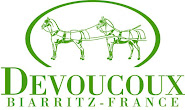Q. What were your favorite moments of the last decade for you or the sport?
A. Well, that’s a tough one. I guess the last decade started in 2000 on the gold medal-winning team in Australia. Being part of that is one of those things in life you can’t replicate: winning gold in your home city. Being involved with sport and seeing it grow and change; to become US citizen was a tough moment, and a big moment, to go through with it and be a part of US Eventing Team. Those were the highlights for this decade.

Q. Safety was a big issue over this last decade. After so many years of eventing—why now?
A. I think it’s the way we are today. Obviously you watch the NFL and concussions are a much more discussed part of commentary now. Especially with the numbers of the people coming into it and the coverage with the internet and with things more public. I went to the USEA Hall of Fame dinner and they had footage of the sports in the early days. It was horrendous, some of the stuff that happened. It’s a sport where you gallop over fixed obstacles; it started out as training for military. It was not some easy sport. We’ve come such a long way in terms of safety. The sport does need to get safer, there’s no question. So we need to make some hard decisions.
Q. What kind of changes do you expect to see in eventing in the coming decade?
A. Well, I think that eventually we’ll have to go to collapseable cross-country jumps. At the moment Craig Thompson, the president of PRO [Professional Rider's Organization], is working on that and I agree with him. The two main ways horses are killed is through heart conditions or accidents on cross-country. We need to do as much work as we can on both of those. If the jumps collapse that would take away a lot of those accidents, especially the rotational fall. The technology isn’t quite there, but almost. You can still make an imposing jump with collapsible technology, but if you make a miscalculation it wouldn’t be a situation where the horse comes to dead stop and it’s catastrophic. It’s just the same in NASCAR with accidents–there are big changes to make it much safer. I like to think that a great rider and great horse will still win. The ones who make an error, we hope, will not pay the ultimate price.
Photo by Emily Daily

Q. What are your plans in the next decade for your own riding career?
A. Well, ten years, it’s hard to say. I can’t keep going on forever. I’ll always be riding and competing at some level. I’ll have to look at what opportunities come up and see. I want to keep competing at the highest level forever but there’ll be a day when I have to scale back. I feel like I’m riding well and have great owners, so can keep going for foreseeable future.
Q. What riders do you have your eye on as making their move in 2010?
A. The thing is, with a riding career you can’t just charge ahead in one year–you’re trying to build your career so you’re not just a one year person—build it so you’re a force in years to come. A lot of riders out there are coming up that way. It is exciting there are some up-and-coming riders and talent. The one thing that riders need to look at is developing the horses themselves. There lies a little worry about that. I question the horses getting off the track don’t have enough talent for today’s sport. A lot of times if you get a horse they’re being sold for a reason. If we can bring along horses a lot better and produce horses a little more like people do in England and Ireland. Unfortunately this sport is not set up ideally for it. It’s expensive. There aren’t little events that are cheap. There is pressure to push the horses, so horses are pushed a bit too much, too early on and you don’t see the benefit. Also, as riders, effort and energy can be put into the wrong kind of horse that doesn’t have the talent to be a force.
Photo by Emily Daily

Q. You were the number one rider eleven times including 2009. So what’s the big secret?
A. Well, I guess, you gotta be consistent. To have the fortune to ride a lot of horses and a lot of people behind me. I came to this country with one horse and slowly but surely built that up. Consistency is the name of the game. Having the ability to have people support you and make sure that they’re enjoying that and staying behind you and being a part of the sport. It’s not just being a good rider, but having someone who supports you and wants to spend money on you year after year. You gotta look at each person and see what they want to achieve. Some people want to know the horse and be a part of it and maybe they enjoy watching you train. Everyone is different. Some people like to go to the big events. A simple thing is, when they come to the event, make sure they enjoy it and are a part of it. Letting your owners enjoy the day out and when they come away they’re enjoying going to the next event.
For more information on Phillip Dutton check out his website at www.phillipdutton.com. And be sure to visit Three Days Three Ways on facebook and twitter!









No comments:
Post a Comment